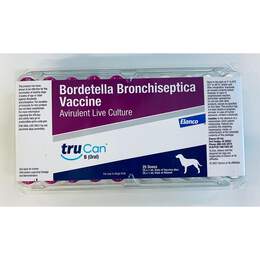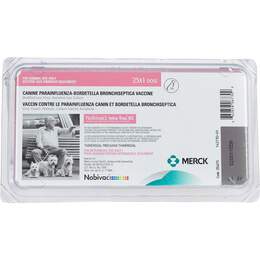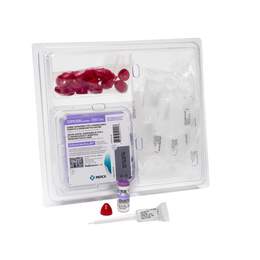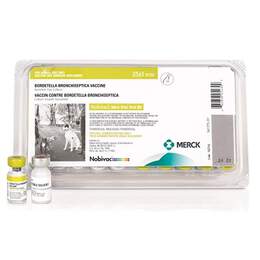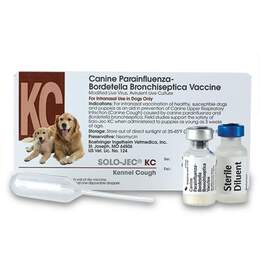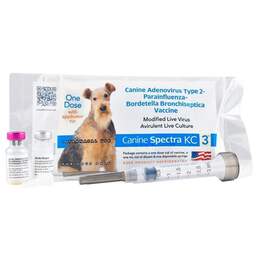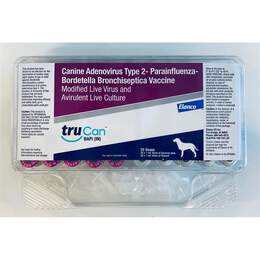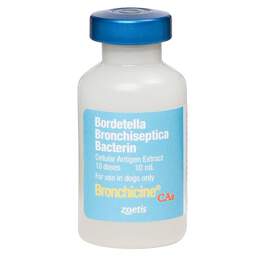Bordetella (Kennel Cough) Vaccines for Dogs
What is Bordetella?
Bordetella bronchiseptica is often referred to as kennel cough. Bordetella bronchiseptica is an upper respiratory illness that causes inflammation. It results from infection with Bordetella bacteria, which is common and highly contagious. The inflammation can cause coughing and sickness, which may lead to infection. Kennel cough can also result from canine parainfluenza virus infection.
What are the causes of Bordetella?
Kennel cough is an extremely contagious respiratory condition that is typically spread in highly-populated dog confinement areas, such as shelters or kennels. It spreads in a number of ways:
- Contaminated surfaces (like kennel runs, toys, water bowls, or even dog parents who are around infected dogs and come home to their own)
- Direct contact with an infected dog
- From dog to dog in airborne droplets
What are the symptoms of Bordetella?
The most common symptoms of kennel cough are:
- Low-grade fever
- Lethargy
- Decreased appetite
- Sneezing
- Runny nose
- Loud, distinct cough
These symptoms can also indicate a more serious disease, such as canine influenza or canine distemper. Therefore, it is important to make an appointment with your veterinarian to diagnose and treat your dog.
What are the risks of Bordetella?
While kennel cough is not considered to be fatal, it can often lead to other, more serious respiratory infections. The inflammation and irritation can cause discomfort, and the infections caused by Bordetella bronchiseptica can be more serious and harmful than the illness itself. The Bordetella vaccine for dogs is the only way to protect your dog from contracting this disease.
What is the best Bordetella vaccine for dogs?
Speak to your veterinarian about choosing the best kennel cough vaccine for your dog. Your vet can explain how often dogs need Bordetella vaccines, Bordetella vaccine cost, and the side effects of Bordetella vaccine in dogs. They can address any concerns you might have about whether your dog can have a reaction to the Bordetella vaccine. They can also familiarize you with the vaccine options, including oral, nasal, or subcutaneous Bordetella vaccines for dogs. Some of the best Bordetella vaccinations on the market are:
- Kennel-Jec 2 – This intranasal Bordetella vaccine for dogs reduces the risk of upper respiratory infection caused by Bordetella bronchiseptica or canine parainfluenza. It is safe for dogs and puppies as young as 3 weeks old.
- Nobivac Intra-Trac KC – Administered intranasally, this Bordetella pertussis vaccine for dogs is safe for use in puppies from the age of 3 weeks. It prevents diseases caused by Canine Parainfluenza virus and Bordetella bronchiseptica infection.
- Nobivac Intra-Trac 3 – Instilled intranasally, this dog kennel cough vaccine protects puppies (from the age of 3 weeks) and dogs against Bordetella bronchiseptica, canine adenovirus, and canine parainfluenza infection.
- Canine Solo Jec KC – Safe for puppies as young as 3 weeks old, this intranasal Bordetella vaccine for dogs will protect your pup from two of the primary causes of kennel cough – Bordetella bronchiseptica and canine parainfluenza.
- Bronchi-Shield – This orally-administered vaccine is used to protect puppies as young as 8 weeks old from diseases caused by canine adenovirus type 2, canine parainfluenza, and Bordetella bronchiseptica.
- Bronchi-Shield III – This intranasal Bordetella vaccine for dogs works to protect puppies and dogs as young as 8 weeks of age from diseases associated with canine parainfluenza, canine adenovirus type 2, and Bordetella bronchiseptica.
- Nobivac Canine Intra-Trac Oral Bb – Safe for use in 7-week-old puppies, this oral vaccine protects dogs from kennel cough caused by Bordetella bronchiseptica.
- Bronchicine CAe – Administered subcutaneously, this vaccine works for puppies as young as 8 weeks old. It protects dogs from diseases associated with Bordetella bronchiseptica.
If you have recently adopted a shelter pet, if your dog spends time at kennels, or if your dog frequents populated areas like dog parks, your veterinarian will likely recommend the Bordetella vaccine. Allivet is the best, most convenient place to buy the Bordetella vaccine for dogs. With affordable costs for Bordetella vaccines, Allivet is the convenient, one-stop choice for purchasing vaccines, medications, supplements, and all your other pet supplies!
Dogs often cough for many of the same reasons we do: breathing in dust and other irritants. Coughing is the body’s response to these irritants that may temporarily block the dog’s airways. It’s part of everyday life for your dog since dogs can sniff 4-6 times a second. However, dogs explore and experience the world by sniffing and can easily pick up parasites, bacteria, and viruses.
If your dog coughs occasionally, they may have picked up an irritant, and coughing is a way for their body to get rid of it. If the cough is persistent, there may be something else going on. If your dog has a persistent cough, contact your veterinarian. After examination and diagnoses, they may prescribe or suggest the proper dog cough medicine for your pet’s condition.
You know your dog better than anyone else, and if you are worried that their cough may be a serious health issue, contact your veterinarian right away. It may be no big deal, but you’ll have peace of mind.
Immediately contact your veterinarian if you notice these symptoms:
- A cough doesn’t get better or gets worse
- Prolonged coughing spells
- Lethargy or low energy
- Lack of appetite
- Swallowed a foreign object
- Pre-existing health conditions that may be worsening
- Coughing up blood
- Trouble breathing or abnormal breathing
Dogs are social by nature and use their noses to get to know new dogs and people. For this reason, viruses and bacteria can easily spread from dog to dog.
Conditions That Can Be Treated with Cough Suppressant for Dogs
Kennel Cough
Probably the most well-known condition that causes dogs to cough, kennel cough is a broad term for tracheobronchitis – infection and inflammation of the dog’s windpipe and lower airways. This condition is more common among younger dogs, but it can affect dogs of any age. Kennel cough is highly contagious, and dogs in group settings such as boarding, daycare, or group training are at higher risk of coming down this condition. If you notice your dog coughing after being in a group situation, they may have picked up kennel cough.
Symptoms: hacking, dry, raspy cough that sounds worse if they pull on their leash. Sometimes retching and vomiting.
Kennel cough may resolve on its own, but veterinarians often prescribe antibiotics and a cough suppressant for dogs such as Temaril-P to reduce coughing and protect against the development of a secondary infection.
Kennel cough is not the only condition that causes dogs to cough, making getting a diagnosis key to treatment. Below are some other reasons why your dog may require cough medicine for dogs.
Canine Influenza
Like humans, dogs can get the flu or canine influenza. The cough is caused by a respiratory infection that lasts from 10-30 days. Severe cases can lead to pneumonia and other secondary infections.
Symptoms: moist or dry cough, loss of appetite, runny nose, lack of energy, fever.
Because canine influenza is a virus, not bacterial like kennel cough, it can’t be cured with antibiotics. Your veterinarian will develop a plan to treat the symptoms while keeping your dog as comfortable as possible until the virus runs its course.
Tracheal Collapse
Also known as tracheal chondromalacia, tracheal collapse happens when the trachea becomes soft and floppy. It occurs most often in small breeds.
Symptoms: dry, hacking, spasmodic cough. Dogs cough repeatedly, especially when excited, and may have difficulty calming down. The coughing gets worse if they pull on their leashes.
Treatment includes weight loss (if obese), cough suppressants, steroids, antibiotics, and bronchodilators to open up the airway.
Pneumonia
Bacterial and viral respiratory infections can develop into pneumonia.
Symptoms: soft, moist cough, fever, lack of appetite, and low energy.
Other Conditions That Can Cause Dogs to Cough
Coughing can also be a symptom of another condition, such as heartworm disease or heart disease. In these instances, your veterinarian will develop a treatment plan specific to your dog and the condition causing them to cough.
Types of Cough Medicine for Dogs
Temaril-P Tablets: Available in by the individual tablet or 100 ct bottle, a prescription from a veterinarian is required. The tablets prevent coughing by reducing inflammation and relieving throat itching.
Cough Tablets for Dogs: Works as an expectorant, antitussive, and cough suppressant. For veterinary use only, no prescription is needed.
HomeoPet Cough Relief: Helps relieve symptoms of kennel cough. No prescription is needed.
HomeoPet Nose Relief: Helps relieve symptoms of upper respiratory conditions, such as sinus infections and inflammation. No prescription is needed.
Albuterol Inhalation Solution: Used for treating or preventing symptoms of asthma and other breathing conditions. It relaxes the muscle in the lungs to help make breathing easier.
Over-the-Counter Medicines to Avoid
Never give your dog human over-the-counter (OTC) medication without approval and supervision from your veterinarian. Although some human medications are generally safe to give dogs, most human medicines have not been approved by the US Food and Drug Administration (FDA) for veterinary use. In addition, some human formulations contain ingredients, such as xylitol, that are safe for us but toxic to dogs.
Always consult your veterinarian before giving your dog any OCT human medications. They know your dog’s medical and health history and can give you the proper dosage amount if the drug is appropriate for your dog’s condition.
Never assume that an OTC drug that is considered safe for most dogs or that you have used before will be safe for your dog now. Formulations can change to include ingredients that are not safe for dogs.
Cough Syrup
Although some cough medicine may be safer for dogs, not all of them are. These medications often contain xylitol, which can cause low blood sugar and liver failure. Coughing may indicate a serious condition, such as kennel cough, canine influenza, and more. If your dog is coughing, it is best to see a veterinarian to determine the cause and use a dog cough medicine they prescribe or recommend.
Ingredients to Avoid
Human cough syrups and other cough medications may contain ingredients that are not safe or are toxic for dogs ingested, such as:
- Caffeine
- Xylitol
- Acetaminophen
- Ibuprofen
In addition, cough medicines formulated for humans may contain doses of antihistamines and decongestants unsafe for dogs, including brompheniramine, pseudoephedrine, and chlorpheniramine.
To keep your dog from being poisoned by additives in human cough syrup, it is best to give them a dog cough medicine whenever possible. Always let your veterinarian know the brand and name of cough medicine you plan to give your dog.


